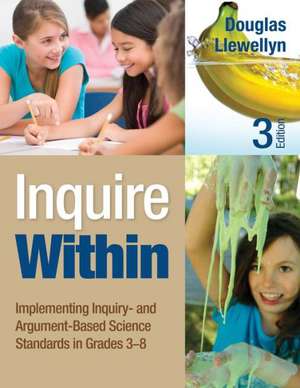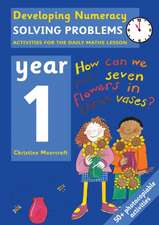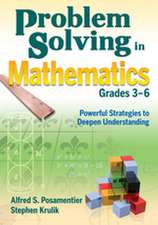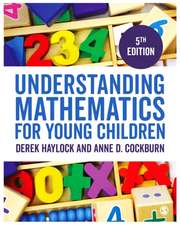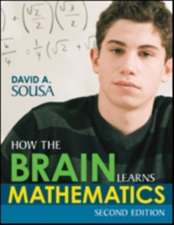Inquire Within: Implementing Inquiry- and Argument-Based Science Standards in Grades 3-8
Autor Douglas J. Llewellynen Limba Engleză Paperback – 7 apr 2014
- Alignment with the new Common Core State Standards and the Next Generation Science Standards
- A central focus on making and defending scientific arguments (i.e. argumentation)
- Guidance on developing the prerequisite attitude and mindset for becoming an inquiry- and argument-based teacher
- How to balance the meaning (the disposition) as well as the mechanics (the how-to) of inquiry and argumentation
- Background on self-directed learning
- Practice in climbing the ladder of professional improvement
- Many new vignettes of inquiry and argument-based activities that integrate language arts with science.
- New sections tie inquiry-based instruction to classroom management, language literacy, the nature of science, multiple intelligence, communication skills, and scientific argumentation.
- The Third Edition is now closely aligned with Teaching High School Science Through Inquiry and Argumentation
Preț: 161.91 lei
Nou
Puncte Express: 243
Preț estimativ în valută:
30.98€ • 33.76$ • 26.11£
30.98€ • 33.76$ • 26.11£
Carte disponibilă
Livrare economică 02-16 aprilie
Livrare express 19-25 martie pentru 52.81 lei
Preluare comenzi: 021 569.72.76
Specificații
ISBN-13: 9781452299280
ISBN-10: 1452299285
Pagini: 392
Ilustrații: illustrations
Dimensiuni: 216 x 279 x 23 mm
Greutate: 0.98 kg
Ediția:Third Edition
Editura: SAGE Publications
Colecția Corwin
Locul publicării:Thousand Oaks, United States
ISBN-10: 1452299285
Pagini: 392
Ilustrații: illustrations
Dimensiuni: 216 x 279 x 23 mm
Greutate: 0.98 kg
Ediția:Third Edition
Editura: SAGE Publications
Colecția Corwin
Locul publicării:Thousand Oaks, United States
Recenzii
"For years Doug Llewellyn's books have provided a strong foundation for both beginning and veteran teachers as they integrated real inquiry experiences into science classes. Today teachers seeking deeper understanding of the Next Generation Science Standards are asking how inquiry fits into the broader array of Science and Engineering Practices/ This updated guide has the answers, expending and enriching the process of inquiry by showing how such practices as scientific argumentation fit. Llewellyn's model of teaching and his rich array of practical examples can help every teacher and student to experiences that clearly illustrate what scientists and engineers do. This is certainly a guide for the next generation of great teachers."
Cuprins
Preface
A Major Shift in Achieving Scientific Literacy
What's New in the Third Edition?
Who Should Read This Book?
Acknowledgments
About the Author
Chapter 1. Constructing an Understanding of Science Inquiry
What the Exploratorium Means by Inquiry
What the National Science Education Standards Say About Inquiry
What the National Science Teachers Association Says About Inquiry
What A Framework for K-12 Science Education and the Next Generation Science Standards Say About Inquiry
Twelve Beliefs (and Rebuttals) About Inquiry-Based Teaching and Learning
Inquiry as a Thinking Skill
"Inquiring With Fruit"
The Inquiry Cycle
A Definition of Inquiry
Inquiry and Scientific Literacy
Inquiry and the Nature of Science
Inquiry and Naturalistic Intelligence
One More Look at Defining Scientific Inquiry
Questions for Reflection and Discussion
Chapter 2. Integrating Language Arts and Argumentation Into Science
The Common Core State Standards and Science: A Natural Pairing
A Fourth-Grade Integrated Language Arts and Science Lesson on Levers
The Influence of Media on Children
What Is a Scientific Argument?
Parts of an Argument
Making a Case for Argumentation
What A Framework for K-12 Science Education and the Next Generation Science Standards Say About Argumentation
Scaffolding Toward Argumentation
Verbal Prompts
Painting a Picture of What Real Scientists Do
Questions for Reflection and Discussion
Chapter 3. Choosing to Become an Inquiry-Based Teacher
Self-Directed Learning
What's Your Instructional Pie?
Steps in Becoming an Inquiry-Based Teacher
Monitoring Your Progress
An Inquiry Self-Assessment Survey
Your First Try at Inquiry
The Importance of Modeling
Making a Commitment
Building Capacity Through Bugs-o-Copters
Your IQ: Inquiry Quotient
Questions for Reflection and Discussion
Chapter 4. Developing a Mind-Set for Inquiry
What Is Constructivism?
The Constructivist Learning Model
The Conceptual Change Model
Can I Change My Mind?
Misconceptions: What You Know May Not Be So
Where Do Misconceptions Come From?
Comparing the Earth and the Moon
How Far Is the Moon?
Why Teach to Misconceptions?
Uncovering Misconceptions in Science
Historical Development of Constructivism
Constructivism Today
How Children Learn Science
Mother Goose as a Scientist
The Child as a Scientist
All Things Are Possible
Questions for Reflection and Discussion
Chapter 5. Different Approaches for Teaching Through Inquiry
Why Johnny Can't Inquire
Promoting Student Inquiries
Invitation to Inquiry
Demonstrated Inquiries
Structured Inquiries
Guided or Teacher-Initiated Inquiries
Self-Directed or Student-Initiated Inquiries
The Role of the Teacher for Each Approach
Guiding Students Into Inquiry
Investigating Balls and Ramps
K-W-L Charts
An Invitation to Inquiry Grid Summary
Modifying a Traditional Lab Into an Inquiry Investigation
Two Contrasting Models of Teaching
The 5E Learning Cycle
Investigating Mealworms
The Constructivist Inquiry Cycle
Effective Inquiry- and Argument-Based Teaching
Questions for Reflection and Discussion
Chapter 6. Designing Problem-Solving and Inquiry- and Argument-Based Investigations
The Myth of the Scientific Method
How Scientists Use Models in Science
Scientific Problem Solving
A Model for Scientific Problem Solving
The Benefits of Scientific Problem-Solving Activities
Scientific Problem Solving Versus Inquiry
Seven Segments of Inquiry
Differentiated Science Inquiry
A Pendulum Investigation
Science Process Skill Stations
Argument-Based Investigations
Questions for Reflection and Discussion
Chapter 7. Managing the Inquiry-Based Classroom
Making Time for Inquiry and Argumentation
Avoiding a Lockstep Approach
Establishing the Right Atmosphere
Teaching Inquiry to Second Language Learners and Students With Special Needs
Strategies for Integrating Language Instruction Into Science
Integrating Inquiry With Technology
Assessing and Monitoring Your Classroom Management Strategies
Questions for Reflection and Discussion
Chapter 8. Developing Effective Questioning Skills for Science Inquiry
Quality Questions Model Quality Thinking
Classroom Questions
Bloom's Taxonomy
Answering Questions and Questioning Answers
Clarifying, Focusing, Prompting, and Probing Questions
Expository Questions
The Interaction of Expository Questioning
15 Tips for Helping You Frame Your Expository Questions
The Power of Praise and Positive Reinforcement
A Three-Step Approach to Better Questioning
Exploratory Questions
Why You Can't Investigate a "Why" Question
Recalibrate Your Questioning Skills
Questions for Reflection and Discussion
Chapter 9. Assessing Science Inquiry
The Anxiety Over Testing
Testing Versus Assessment Versus Evaluation
Curriculum Alignment
Assessing Inquiry-Based Science
Three Categories of Assessment
Designing Assessments
Choosing the Right Test
Differentiated Assessment
Using a Multiple-Assessment Approach
Authentic Assessments
Transitioning to New Assessment Systems
Questions for Reflection and Discussion
Chapter 10. Creating a Classroom Culture of Inquiry and Argumentation
Traditional and Inquiry-Centered Classrooms
Design Your Inquiry-Centered Classroom
Students in an Inquiry-Centered Classroom
Teachers in an Inquiry-Centered Classroom
Constructing a Graphic Organizer of an Inquiry-Centered Classroom
Teachers as Agents of Change
Highly Effective Science Teachers
Final Thoughts: Your Legacy
Questions for Reflection and Discussion
Resource A. Resources for Teachers
Print Resources on Inquiry- and Argument-Based Teaching
Print Resources on Designing Inquiry- and Argument-Based Investigations
Print Resources on Constructivism
Print Resources on Different Approaches to Science Inquiry
Print Resources on Science Standards and Reform
Print Resources on Science Literacy, History of Science, and the Nature of Science
Print Resources on Demonstrated Inquiries and Discrepant Events
Print Resources on Second Language Learners
Print Resources on Effective Questioning Skills
Print Resources on Assessment
Online Resources on Inquiry
Professional Organizations
Resource B. Lever Lesson Plan
Resource C. Bottle
Resource D. Rubric for Becoming an Inquiry-Based Teacher
Resource E. Inquiry Self-Assessment Response Grids
Resource F. Inquiry Self-Assessment Summary Matrix
Resource G. Short-Eared and Long-Eared Bugs-o-Copters
Resource H. Investigating Oobleck
Resource I. Seven Segments of Inquiry
Resource J. How to Make a Cartesian Diver
Resource K. Touch Squares
Resource L. 18 Concept Statements
References
Index
A Major Shift in Achieving Scientific Literacy
What's New in the Third Edition?
Who Should Read This Book?
Acknowledgments
About the Author
Chapter 1. Constructing an Understanding of Science Inquiry
What the Exploratorium Means by Inquiry
What the National Science Education Standards Say About Inquiry
What the National Science Teachers Association Says About Inquiry
What A Framework for K-12 Science Education and the Next Generation Science Standards Say About Inquiry
Twelve Beliefs (and Rebuttals) About Inquiry-Based Teaching and Learning
Inquiry as a Thinking Skill
"Inquiring With Fruit"
The Inquiry Cycle
A Definition of Inquiry
Inquiry and Scientific Literacy
Inquiry and the Nature of Science
Inquiry and Naturalistic Intelligence
One More Look at Defining Scientific Inquiry
Questions for Reflection and Discussion
Chapter 2. Integrating Language Arts and Argumentation Into Science
The Common Core State Standards and Science: A Natural Pairing
A Fourth-Grade Integrated Language Arts and Science Lesson on Levers
The Influence of Media on Children
What Is a Scientific Argument?
Parts of an Argument
Making a Case for Argumentation
What A Framework for K-12 Science Education and the Next Generation Science Standards Say About Argumentation
Scaffolding Toward Argumentation
Verbal Prompts
Painting a Picture of What Real Scientists Do
Questions for Reflection and Discussion
Chapter 3. Choosing to Become an Inquiry-Based Teacher
Self-Directed Learning
What's Your Instructional Pie?
Steps in Becoming an Inquiry-Based Teacher
Monitoring Your Progress
An Inquiry Self-Assessment Survey
Your First Try at Inquiry
The Importance of Modeling
Making a Commitment
Building Capacity Through Bugs-o-Copters
Your IQ: Inquiry Quotient
Questions for Reflection and Discussion
Chapter 4. Developing a Mind-Set for Inquiry
What Is Constructivism?
The Constructivist Learning Model
The Conceptual Change Model
Can I Change My Mind?
Misconceptions: What You Know May Not Be So
Where Do Misconceptions Come From?
Comparing the Earth and the Moon
How Far Is the Moon?
Why Teach to Misconceptions?
Uncovering Misconceptions in Science
Historical Development of Constructivism
Constructivism Today
How Children Learn Science
Mother Goose as a Scientist
The Child as a Scientist
All Things Are Possible
Questions for Reflection and Discussion
Chapter 5. Different Approaches for Teaching Through Inquiry
Why Johnny Can't Inquire
Promoting Student Inquiries
Invitation to Inquiry
Demonstrated Inquiries
Structured Inquiries
Guided or Teacher-Initiated Inquiries
Self-Directed or Student-Initiated Inquiries
The Role of the Teacher for Each Approach
Guiding Students Into Inquiry
Investigating Balls and Ramps
K-W-L Charts
An Invitation to Inquiry Grid Summary
Modifying a Traditional Lab Into an Inquiry Investigation
Two Contrasting Models of Teaching
The 5E Learning Cycle
Investigating Mealworms
The Constructivist Inquiry Cycle
Effective Inquiry- and Argument-Based Teaching
Questions for Reflection and Discussion
Chapter 6. Designing Problem-Solving and Inquiry- and Argument-Based Investigations
The Myth of the Scientific Method
How Scientists Use Models in Science
Scientific Problem Solving
A Model for Scientific Problem Solving
The Benefits of Scientific Problem-Solving Activities
Scientific Problem Solving Versus Inquiry
Seven Segments of Inquiry
Differentiated Science Inquiry
A Pendulum Investigation
Science Process Skill Stations
Argument-Based Investigations
Questions for Reflection and Discussion
Chapter 7. Managing the Inquiry-Based Classroom
Making Time for Inquiry and Argumentation
Avoiding a Lockstep Approach
Establishing the Right Atmosphere
Teaching Inquiry to Second Language Learners and Students With Special Needs
Strategies for Integrating Language Instruction Into Science
Integrating Inquiry With Technology
Assessing and Monitoring Your Classroom Management Strategies
Questions for Reflection and Discussion
Chapter 8. Developing Effective Questioning Skills for Science Inquiry
Quality Questions Model Quality Thinking
Classroom Questions
Bloom's Taxonomy
Answering Questions and Questioning Answers
Clarifying, Focusing, Prompting, and Probing Questions
Expository Questions
The Interaction of Expository Questioning
15 Tips for Helping You Frame Your Expository Questions
The Power of Praise and Positive Reinforcement
A Three-Step Approach to Better Questioning
Exploratory Questions
Why You Can't Investigate a "Why" Question
Recalibrate Your Questioning Skills
Questions for Reflection and Discussion
Chapter 9. Assessing Science Inquiry
The Anxiety Over Testing
Testing Versus Assessment Versus Evaluation
Curriculum Alignment
Assessing Inquiry-Based Science
Three Categories of Assessment
Designing Assessments
Choosing the Right Test
Differentiated Assessment
Using a Multiple-Assessment Approach
Authentic Assessments
Transitioning to New Assessment Systems
Questions for Reflection and Discussion
Chapter 10. Creating a Classroom Culture of Inquiry and Argumentation
Traditional and Inquiry-Centered Classrooms
Design Your Inquiry-Centered Classroom
Students in an Inquiry-Centered Classroom
Teachers in an Inquiry-Centered Classroom
Constructing a Graphic Organizer of an Inquiry-Centered Classroom
Teachers as Agents of Change
Highly Effective Science Teachers
Final Thoughts: Your Legacy
Questions for Reflection and Discussion
Resource A. Resources for Teachers
Print Resources on Inquiry- and Argument-Based Teaching
Print Resources on Designing Inquiry- and Argument-Based Investigations
Print Resources on Constructivism
Print Resources on Different Approaches to Science Inquiry
Print Resources on Science Standards and Reform
Print Resources on Science Literacy, History of Science, and the Nature of Science
Print Resources on Demonstrated Inquiries and Discrepant Events
Print Resources on Second Language Learners
Print Resources on Effective Questioning Skills
Print Resources on Assessment
Online Resources on Inquiry
Professional Organizations
Resource B. Lever Lesson Plan
Resource C. Bottle
Resource D. Rubric for Becoming an Inquiry-Based Teacher
Resource E. Inquiry Self-Assessment Response Grids
Resource F. Inquiry Self-Assessment Summary Matrix
Resource G. Short-Eared and Long-Eared Bugs-o-Copters
Resource H. Investigating Oobleck
Resource I. Seven Segments of Inquiry
Resource J. How to Make a Cartesian Diver
Resource K. Touch Squares
Resource L. 18 Concept Statements
References
Index
Notă biografică
Descriere
A new edition for science teachers on teaching science through an inquiry-based process.
